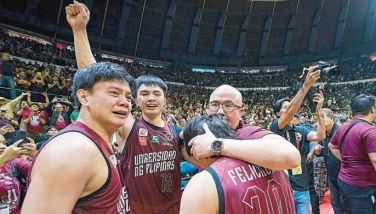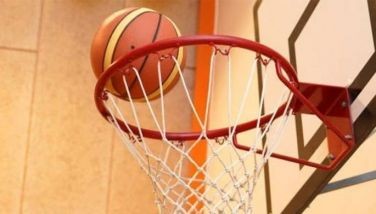Scouting, scouring and scoring
April 12, 2003 | 12:00am
Scouting is the least-developed among coaching skills in the country. Even in the most glamorous, high-profile sport of professional boxing, Filipino fighters still go into the ring blind, not knowing the fighting styles of their opponents. In other sports, it is still very much the same, with basketball having a great headstart on all its sporting siblings.
Scouting in other countries, however, has become a much more long-term endeavor, and even includes genetic predispositions to size, body type and blood type. In some countries, government agencies post notices looking for certain types of youth, even adding illustrated growth charts so parents can approach them if their offspring meet a certain criteria.
A few years ago, Philippine Sports commissioner Tisha Abundo proposed Talent Identification Program (TIP),designed to find out what kind of material we have for particular sports. Sadly, this program has not met its full potential, although it has had a few lucky strikes. But what we need is a more comprehensive search for the children who will become the kinds of athletes and sportsmen of tomorrow. If we don’t then we must suffer the fate of falling further behind our less athletically gifted neighbors.
Generally, athletes are born from their environment. Ethiopian distance runners have simply adjusted to the facts of life that mass transportation, good roads and adequate commercial facilities are not abundant in their vicinity. Australians have adapted to a big coastline by developing swimmers, and their wide open spaces have also spawned a passion for dog-and horse-racing. Naturally, countries blanketed by fine snow will use this to entertain themselves and inevitably compete in winter sports.
Here in the Philippines, we are frustrated in finding the proper talent in basketball. There was a point even then-Sen. Joey Lina proposed that we use basketball players to fuel other sports. Hoops has always been considered the mistress who steals athletes’ hearts from their original loves. How many footballers, runners, high jumpers and volleyball players have been lured to basketball simply because it has a bigger audience, or pays better?
Now, a private company is putting together a plan to seek out all those overly tall youth who may have a great use for the country in sporting competition.
In an exclusive interview with The Star, officials of Burlington have revealed that they are launching "Tuklas-Taas," a nationwide search for youth who will form the backbone of our national youth basketball team, and eventually the men’s team.
"This is probably the first time that we are holding try-outs for the Philippine youth team on a nationwide basis," said Ruddy Tan, general manager of Burlington. "We will be bringing these young players to Manila, renovating the current players’ quarters, and setting them up for long-term training."
Tuklas-Taas is targeting 15 regions in the Philippines, with tall youngsters 14 to 17 years old as the main focus. Those selected will be flown to Metro Manila, housed among other national athletes, and trained together for at least two years.
"We are planning to have two sets of players," adds Teddy Pereña of T.E.A.M., which is organizing the endeavor for Burlington. "Since some of the players will be approaching 18, we need to prepare and mature the next batch as soon as possible."
Burlington plans to reward the school or community each player comes from with P 20,000 worth of sports equipment. Some players will come from little-known schools, but some will be out-of-school youth, and will therefore represent their communities.
There are only two possible obstacles to this program: the schools or commercial teams the older players suit up for. As we experienced in last year’s SEABA junior championship, when the tournament was moved from June to July, the NCAA and UAAP teams who lent players from the pool yanked them back home. Now, we will have a permanent pool of talent, much like the Northern Cement team which immeasurably benefitted basketball in the Philippines, and whose track record for success and longevity is still unequalled.
The Tuklas-Taas plan will also be meaningful in a lot of ways.It will establish a pipeline through which athletic talent may be identified for other sports, as well. It will be only natural for kids from the provinces to gravitate towards the scouts in the hopes of improving their skills or developing a talent that may take them places.
Eventually, Tuklas-Taas may become a feeder system for the Philippine Sports Commission (which is weighed down by inner conflicts and personalized agendas to produce long-term results) and start the cycle of improvement of Philippine sports. Not since Mike Keon and Project: Gintong Alay was there any system for long-term development.
Perhaps the time has come. And the private sector had to save the day.
Watch today’s episode of The Basketball Show at 4p.m. over IBC-13. We will feature the PBA’s anniversary bash, Jojo Lastimosa’s basketball clinic, the reason behind your favorite players’ jersey numbers, our Slam Book, and many more. The Basketball Show is also seen in North America and the Middle East over PinoyCentralTV, and is sponsored by Adidas, Columbia International Foods, Red Horse Extra Strong Beer, and Accel sports gear.
Scouting in other countries, however, has become a much more long-term endeavor, and even includes genetic predispositions to size, body type and blood type. In some countries, government agencies post notices looking for certain types of youth, even adding illustrated growth charts so parents can approach them if their offspring meet a certain criteria.
A few years ago, Philippine Sports commissioner Tisha Abundo proposed Talent Identification Program (TIP),designed to find out what kind of material we have for particular sports. Sadly, this program has not met its full potential, although it has had a few lucky strikes. But what we need is a more comprehensive search for the children who will become the kinds of athletes and sportsmen of tomorrow. If we don’t then we must suffer the fate of falling further behind our less athletically gifted neighbors.
Generally, athletes are born from their environment. Ethiopian distance runners have simply adjusted to the facts of life that mass transportation, good roads and adequate commercial facilities are not abundant in their vicinity. Australians have adapted to a big coastline by developing swimmers, and their wide open spaces have also spawned a passion for dog-and horse-racing. Naturally, countries blanketed by fine snow will use this to entertain themselves and inevitably compete in winter sports.
Here in the Philippines, we are frustrated in finding the proper talent in basketball. There was a point even then-Sen. Joey Lina proposed that we use basketball players to fuel other sports. Hoops has always been considered the mistress who steals athletes’ hearts from their original loves. How many footballers, runners, high jumpers and volleyball players have been lured to basketball simply because it has a bigger audience, or pays better?
Now, a private company is putting together a plan to seek out all those overly tall youth who may have a great use for the country in sporting competition.
In an exclusive interview with The Star, officials of Burlington have revealed that they are launching "Tuklas-Taas," a nationwide search for youth who will form the backbone of our national youth basketball team, and eventually the men’s team.
"This is probably the first time that we are holding try-outs for the Philippine youth team on a nationwide basis," said Ruddy Tan, general manager of Burlington. "We will be bringing these young players to Manila, renovating the current players’ quarters, and setting them up for long-term training."
Tuklas-Taas is targeting 15 regions in the Philippines, with tall youngsters 14 to 17 years old as the main focus. Those selected will be flown to Metro Manila, housed among other national athletes, and trained together for at least two years.
"We are planning to have two sets of players," adds Teddy Pereña of T.E.A.M., which is organizing the endeavor for Burlington. "Since some of the players will be approaching 18, we need to prepare and mature the next batch as soon as possible."
Burlington plans to reward the school or community each player comes from with P 20,000 worth of sports equipment. Some players will come from little-known schools, but some will be out-of-school youth, and will therefore represent their communities.
There are only two possible obstacles to this program: the schools or commercial teams the older players suit up for. As we experienced in last year’s SEABA junior championship, when the tournament was moved from June to July, the NCAA and UAAP teams who lent players from the pool yanked them back home. Now, we will have a permanent pool of talent, much like the Northern Cement team which immeasurably benefitted basketball in the Philippines, and whose track record for success and longevity is still unequalled.
The Tuklas-Taas plan will also be meaningful in a lot of ways.It will establish a pipeline through which athletic talent may be identified for other sports, as well. It will be only natural for kids from the provinces to gravitate towards the scouts in the hopes of improving their skills or developing a talent that may take them places.
Eventually, Tuklas-Taas may become a feeder system for the Philippine Sports Commission (which is weighed down by inner conflicts and personalized agendas to produce long-term results) and start the cycle of improvement of Philippine sports. Not since Mike Keon and Project: Gintong Alay was there any system for long-term development.
Perhaps the time has come. And the private sector had to save the day.
BrandSpace Articles
<
>
- Latest
- Trending
Trending
Latest
Trending
Latest
Recommended





























